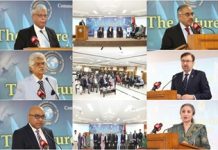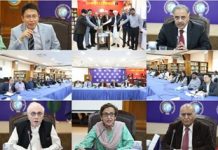Carved out as independent states out of the British Indian empire 66 years back, the Muslim-majority Pakistan and the Hindu-majority India still remain adversaries. There’s hardly anything between the two South Asian nations that could be called friendly. This is unfortunate, indeed, because today people are by and large yearning for peace and development on both sides of the border.
Even earlier this month, there was an almost daily exchange of fire by the militaries of the two neighbouring countries resulting in a number of casualties across either side the Line of Control dividing the disputed former State of Jammu and Kashmir.
Just as in this latest escalation, the two sides would routinely blame each other for unprovoked firing. The situation has, nevertheless, taken a more serious turn by first Pakistan’s Parliament passing a unanimous resolution condemning India, and asking for a formal apology. This resolution resulted in India’s parliament rejecting it, and asking Pakistan instead to offer an apology.
What prevents Pakistan and India from declaring war on the other, however, is believed by many to be the nuclear status of both. That is but a tenuous reassurance. Even an accidental major act of aggression by either side can trigger off open warfare.
This particular escalation is all the more deplorable as Pakistan’s new Prime Minister Nawaz Sharif has both during the election campaign as also immediately after assuming office repeatedly held out a hand of friendship to India.
In other words, he enjoys the mandate of the people of Pakistan to open a fresh chapter of bilateral cooperation with the historically enemy state of India.
Not only Nawaz Sharif’s ruling party but virtually the entire spectrum of political parties in Pakistan is unanimous in developing friendly relations not just but the other three neighbouring countries – China, Afghanistan and Iran, in particular in the economic sphere. It should be added here that the current military leadership in Pakistan also shares this view with the rest of the nation. The Chief of Army Staff took the bold initiative of unilaterally reiterating the offer to India for a phased withdrawal of the armies of the two sides from Siachen which, for reasons we shall revert to below, was not reciprocated by India.
The days of waging a holy war (jihad) against the ‘infidel’ Hindus to get fellow Muslims liberated in Jammu and Kashmir or the even the more fanciful mission of flying the flag of Islam on the rampart of the Ford Fort in the Indian capital, have long been over.
Of course a defensive war the nation and its armed forces would fight come what may. But, it needs to be kept in mind that the past 34 years of bloodletting in and around Pakistan – starting with the Soviet occupation of Afghanistan, the subsequent instability in Afghanistan and then the Western presence in that particular neighbouring country – together with both military and civil casualties as a result directly or indirectly of this so-called War on Terror, has left no appetite for any more death and destruction in Pakistan.
Why then does normalisation between Pakistan and India still remain elusive? The answer is not far to seek. Not much appreciated and hence taken into account by many observers of the Indian scene is the increasing political assertiveness and influence over that country’s vital external relations that the Indian army has come to exert over the past few years, especially in the South Asian and Chinese contexts.
Let’s take the two political decisions agreed to in principle by the civilian governments in Islamabad and New Delhi which, going by well informed and reputable Indian news sources; have been vetoed by our India’s generals. The first relates to the demarcation of the disputed border of Sir Creek along Pakistan southern-most edge. After the laborious and time-consuming process of surveys being conducted by both sides leading to an understanding reached between Islamabad and New Delhi on demarcation of the mutually-agreed border, the Indian army put its foot down with the result that the agreement still remains unsigned and unimplemented.
The second has already been mentioned before, concerning the disputed Siachen area and further north from the glacier all the way to Pakistan’s border with China. What was agreed upon was a phased withdrawal of troops by both sides from the frozen heights of Siachen. That too has been stalled by the Indian army. Apart from causing totally avoidable loss of human life to both the sides resulting from the now less frequent skirmishes, the extreme weather conditions together with lack of oxygen are also taking their toll.
The irony here is that, logistically, it is far more expensive for India to maintain its military presence at Siachen than Pakistan because of the comparable difference in distance involved for provision of supplies, medical services, etc.
So, all said and done, the point is that whereas many Pakistanis see the prospects of the recent elections laying the foundations of a hopefully healthy democratic continuity with a correspondingly decreasing military role in decision-making, the situation is taking a turn in India that is diametrically opposite.
That, in my view, remains the main stumbling block in the way of any improvement of relations between Pakistan and India.
Finally, yet another deplorable dimension of the recent setback suffered by Pakistan-India relations also need to be mentioned. There were talks underway between the two sides for cooperation in the energy sector. Those included Pakistan’s purchasing electricity from the Indian state of Punjab as also the laying of a pipeline for Pakistan to import liquefied natural gas from India which the latter gets from Qatar. These projects, obviously, cannot now be pursued in the enhanced tension in the bilateral ties.
I have long advocated the promotion of bilateral, trilateral or even multilateral infrastructural linkages – especially in the currently all-important energy sector – as such linkages between countries of the region as these best serve the interests of peace, security and stability.
The same logic could surely not be lost to the Indian army which, presumably, has scuttled these projects, instead upping the ante with Pakistan.
The writer is Project Consultant/Editor at the Institute of Strategic Studies, Islamabad.
Views expressed are of the author and do not necessarily reflect the views of ISS or of the Government of Pakistan.












